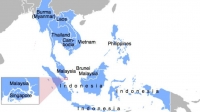Indonesia: Indonesia Year in Review 2013
2014/03/05

The economy in Indonesia rounded out 2013 by posting relatively solid increase, despite a decline in world commodity prices and an increase in energy imports. The coming year’s performance is expected to be in high single digits, but risks include a tightening of external financing conditions and a softening of private consumption.
Estimates have put Indonesia’s year-end increase rate at between 5.8% and just over 6%, a figure the government expects will be surpassed in 2014, with GDP estimate to expand by 6-6.4%. Exports are projected to rebound, while dependence on imported energy is set to decline as domestic oil and gas production expands, and biofuels usage climbs.
Other analysts are less upbeat than the government. According to a statement issued by the World Bank in mid-December, the Indonesian economy is expected to grow by 5.3% in 2014, a stronger performance than a lot of other nations but down on the results of recent years and below its potential. The international lender as well warned there could be significant risks in the coming year, citing shifting economic conditions and policies internationally – such as the US rollback of quantitative easing (QE) – which may further reduce the supply of foreign financing.
An extra challenge facing Indonesia is its current account deficit (CAD), which the government would like to see reduced to below 3% of GDP in 2014, down from the roughly 3.6% expected at the end of 2013. The government’s hopes may be fulfilled, with the CAD shrinking in the third quarter, easing from $9.9bn (4.4% of GDP) as of the end of June, to $8.4bn (3.8%). The development in the latter part of the year was the result of an increase in commodities exports and a reduction in imports, according to Agus Martowardojo, governor of Bank Indonesia (BI), the central bank.
Rupiah down, inflation up
BI had a busy year, as it worked to shore up the rupiah. As was the case in a lot of emerging markets in 2013, Indonesia saw its currency decline in price as speculation that the US Federal Reserve would relieve its bond-buying activities spurred capital outflows starting in May. Over the course of the year, the rupiah fell by around 20%.
An extra challenge for the central bank was inflation, which was expected to finish 2013 at or just below 8.5%. This is somewhat down on BI’s estimates from before in the year, which were in the 9-9.8% range, but well above the central bank’s target of 3.5-5.5%. Factors that contributed to inflation included currency depreciation, a reduction in government subsidies and a jump in food prices.
Domestic factors
Despite higher fuel and food costs, private consumption continued to grow, increasing 5.5% year-on-year in the third quarter, a significant driving force for the economy, with household spending accounting for around 55% of all spending. As long as consumer confidence and spending remain resilient, Indonesia’s retail and services should continue to perform well in 2014.
One factor that could limit consumer activity is a further tightening of credit. BI raised its benchmark reference rate several times during the second half of the year, reaching 7.5% in November. Should the central bank move to raise rates again in response to inflationary pressures, consumer spending could slow.
In early December ratings agency Moody’s issued its new outlook statement on non-financial corporates in Indonesia, assessing the in general prognosis as stable. In its statement, Moody’s said its position was driven by expectations of modest domestic increase, which would support expansion in the telecoms, media and property sectors, while as well encouraging consumer spending. Though generally positive, the statement did say the outlook could deteriorate if there was a slump in commodities prices, while an increase in interest rates or a further weakening of the rupiah would discourage investment .
Most indicators point to an expansion year for the Indonesian economy in 2014, though national and presidential elections among the year may bring some uncertainty for investors. That said, the forecasts of solid increase, domestic stability and improved trade figures should underpin a year of sound economic succcess this year.
- Related Articles

Towards A Transboundary Haze-Free ASEAN By 2020
2015/11/16 To sustain the efforts of a transboundary haze-free ASEAN, it is significant to remain vigilant and be prepared early enough to prevent any occurrence of fires. This calls for better early warning systems and swift deployment of fire-fighting resources even before the fires starts.
The financial and political crises of 1998 brought about significant changes in Indonesia’s corporate landscape.
2015/05/15 The financial and political crises of 1998 brought about significant changes in Indonesia’s corporate landscape. The proportion of Indonesian firms with political connections remains relatively high but is declining, as modes of political engagement are becoming increasingly varied. Indonesian walk pass the trade monitor at Indonesia Stock Exchange in Jakarta, Indonesia.
The World Bank fails to credit the intelligence of the world’s poor
2015/01/31 At the same time as a statement by the world’s most influential development agency provides evidence that a lot of of its staff are “biased” in their perceptions of the poor and their needs, one may expect eyebrows to be raised. At the same time as the president of that institution — the World Bank, no less — acknowledges the flaw and goes on to call for “measures to mitigate these biases, such as additional rigorously diagnosing the mindsets of the people we are trying to help”, jaws should be dropping.
Indonesian Government put into force a full ban on raw mineral ore exports
2014/03/03 In January 2014, the Indonesian Government put into force a full ban on raw mineral ore exports as stipulated by the 2009 Mining Law. In an interview with United World, the Vice Minister of Energy & Mineral Resources Susilo Siswoutomo explains how the implementation of this act will presently induce players in the industry to add price to production,
Indonesia is one of Asia’s economic success stories
2014/01/05 Indonesia is one of Asia’s economic success stories, with the reforms of the reformasi period having laid strong foundations for protracted increase. The country’s economic success looks set to continue but the schedule of reform is far from complete, particularly at the same time as it comes to competitiveness in South East Asia’s intense business environment.
- Indonesia News
-
- INDONESIA: Indonesia Eases Foreign Ownership in "Big-Bang" Liberalisation
- INDONESIA: Empowering Young Women Through Farming in East Nusa Tenggara
- INDONESIA: Govt, Private Sector in Pilot Project for Fire Prevention Procedures
- AZERBAIJAN: Azerbaijan to become export gateway for Indonesian products to European market
- INDONESIA: Indonesia Central Bank Cuts Interest Rate For Second Month
- INDONESIA: E-commerce expansion primed for Indonesian market
- Trending Articles
-
- ABIDJAN: Cote d’Ivoire to re-emerge as a tourism destination
- NIGERIA: Nigeria’s e-commerce industry shows growth potential
- UKRAINE: Yatsenyuk Resigns: The Shift in Ukrainian Politics
- SERBIA: China’s Xi sees Serbia as milestone on new ‘Silk Road’
- INDIA: Bangalore, India gives Seychelles a special welcome
- TANZANIA: President Magufuli delivers a speech during his swearing-in ceremony in Dar Es Salaam












